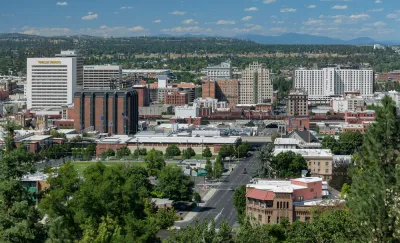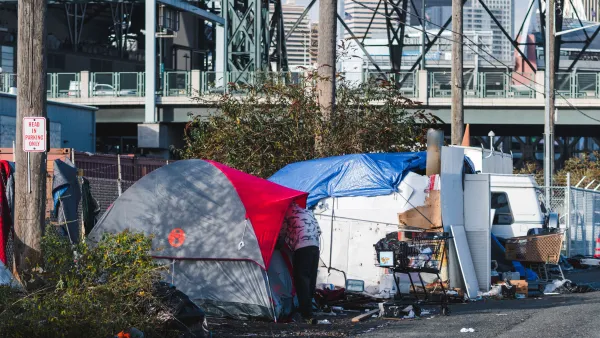With $24 million in state funding directed to Spokane’s efforts to reduce homelessness, city officials plan to relocate the over 600 residents of Camp Hope. But will services follow?

Writing for RANGE Media, Carl Segerstrom describes the uncertain future facing the residents of Camp Hope, a growing encampment located on land owned by the Washington Department of Transportation. “Covering a full city block just off of Interstate 90 a couple miles east of downtown Spokane, Camp Hope is home to more than 600 people, making it the largest encampment on state land in Washington.”
According to Segerstrom, “Service providers regularly visit the camp to connect residents with services like addiction treatment and healthcare. A dozen port-a-potties line the sidewalk and, on the day we visited, a shower trailer was available for residents to use.” As such, “The combination of on-site services and a tight-knit community has drawn people experiencing homelessness to the encampment.”
As Segerstrom writes, “What’s to come — more than $24 million in state funding and the relocation of the camp’s residents — is a testament to the endurance of the Camp Hope community and the intractability of the homelessness crisis in Spokane and across Washington.” But residents are worried about the future of their community and the options before them. “One solution that residents said they prefer over congregate shelters is pallet shelters — small, semi-permanent structures that are climate controlled and can be locked.” Segerstrom notes that “Surveys of 601 Camp Hope residents conducted by Jewels Helping Hands found that every camper would be willing to move into a pallet shelter or tiny home, and only 51 would be willing to go to a shelter, depending on the operator.”
How the funding will be used is yet to be decided by city and county officials, but there is some agreement on purchasing a hotel and renovating an existing shelter.
FULL STORY: Camp Hope residents built a community. Its future is not in their control.

Analysis: Cybertruck Fatality Rate Far Exceeds That of Ford Pinto
The Tesla Cybertruck was recalled seven times last year.

National Parks Layoffs Will Cause Communities to Lose Billions
Thousands of essential park workers were laid off this week, just before the busy spring break season.

Retro-silient?: America’s First “Eco-burb,” The Woodlands Turns 50
A master-planned community north of Houston offers lessons on green infrastructure and resilient design, but falls short of its founder’s lofty affordability and walkability goals.

Test News Post 1
This is a summary

Analysis: Cybertruck Fatality Rate Far Exceeds That of Ford Pinto
The Tesla Cybertruck was recalled seven times last year.

Test News Headline 46
Test for the image on the front page.
Urban Design for Planners 1: Software Tools
This six-course series explores essential urban design concepts using open source software and equips planners with the tools they need to participate fully in the urban design process.
Planning for Universal Design
Learn the tools for implementing Universal Design in planning regulations.
EMC Planning Group, Inc.
Planetizen
Planetizen
Mpact (formerly Rail~Volution)
Great Falls Development Authority, Inc.
HUDs Office of Policy Development and Research
NYU Wagner Graduate School of Public Service




























